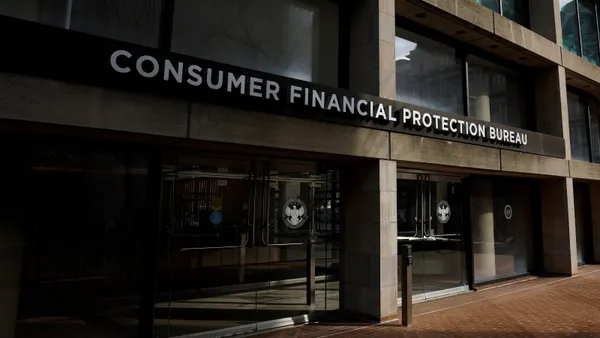Dive Brief:
-
Fintech company Square sued the city of San Francisco, where the company is based, in an effort to recover $1.27 million — a portion of the gross receipts tax it paid in 2014 and 2015 — plus interest and attorneys' fees.
-
At issue is the company's classification. San Francisco charges financial services companies a tax rate between 0.40% and 0.56%. An information business, however, pays a rate between 0.125% and 0.475%.
- Square may have to pay San Francisco additional taxes for subsequent years if it is unable to convince the city of its status as a tech company, it said in its most recent securities filing, according to The Wall Street Journal.
Dive Insight:
Square argues that it is a tech company, despite having filed paperwork in December to open a bank in Utah. The company pulled an earlier application last year over procedural issues.
"Square's production processes are primarily focused on the development and production of software," the company said in a complaint filed in California state court. "The vast majority of Square's employees are either software engineers or employees supporting them."
San Francisco's treasurer, Jose Cisneros, audited Square's taxes paid in 2014 and 2015 and issued the company a notice in 2017 indicating it failed to pay all of its taxes according to the rate owed by a financial services company.
After several hearings and appeals, Square paid the taxes Cisneros said they owed, then filed a claim in January for a refund. The city denied the claim in March, the San Francisco Examiner reported.
"The audit in question was both thorough and fair, and I stand by the findings of this office," Cisneros told the Examiner.
Square also said in its lawsuit San Francisco "improperly taxed" Square "on receipts collected and retained by third parties and were never in Square's possession or control." Square takes a 2.75% cut of most credit-card payments to its small-business customers. More than half of what Square derives from those transactions must be paid out to banks and credit-card networks, the company said. Additionally, the company said it didn't receive proper tax credits for gross receipts paid in other states.
"We have and will continue to pay our fair share, but when we're treated differently than other companies and taxed on money we never actually receive, this is not fair or consistent," a Square spokeswoman said in a statement, according to The Guardian.
Square's chief executive, Jack Dorsey, is also the founder and CEO of Twitter, which received a city tax break that San Francisco officials estimate saved the company about $40 million in the two years after it went public in 2013, the Examiner reported.
Dorsey last fall opposed a local ballot measure, Proposition C, that would have increased taxes on Square and other businesses to raise money to fight homelessness in San Francisco. Voters approved the proposition in November. Square announced plans a month later to open an office across in neighboring Oakland, according to The Wall Street Journal.












